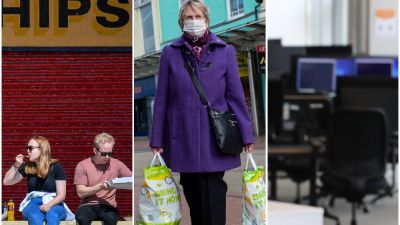Masks to stay, 'soldiering on' through the common cold will stop and the nature of work has changed forever, expert says

Life will not go back to the way it was before the coronavirus crisis and many aspects of pandemic living will be with us for some time to come, a behavioural expert has said.
In a wide-ranging, and at times philosophical, interview with ITV Wales Dr Simon Williams, an academic at Swansea University, said he believed activities such as mask-wearing and remote working would remain a core part of daily life.
"I don't think we'll ever go back to how things were," Dr Williams said.
Citing a recent Public Health Wales study, Dr Williams explained how he felt there could be a public appetite to continue wearing masks and that basic hygiene would be viewed with greater importance.
"We've learned a few things around basic hygiene. I know that sounds like an obvious point but I think we'll be extra cautious going forward, whether that's hand washing or mask wearing.
"I'm not alone in thinking that, there was a recent survey by Public Health Wales that said 85% of people in Wales think that masks are here to stay albeit occasionally and not mandatory."
Public attitudes to the common cold and the notion of "soldiering on" would also likely change, Dr Williams said.
"We might think twice, and these are good things, where we've got the sniffles or a cough or a cold and we won't kind of soldier on into work and hopefully employers will be supportive of that.
"I think we've got a newfound respect for the role of asymptomatic transmission but also the fact that, even if we think of ourselves as being maybe young or healthy or not particularly vulnerable, that we can play a big role in passing on viruses to people that are more vulnerable.
"I think that kind of thing is here to stay."
The core nature of work and how employers and employees conduct their business has also been irreversibly changed, according to Dr Williams.
He said he felt the pandemic had offered a learning experience for many organisations around what is achievable from practices such as remote working.
"Certainly at a societal level, or the organisational level, for a lot of businesses and companies I think they have learned a lot from the pandemic and I think as such we won't go back to how things were.
As people may choose to live in more remote areas and move away from big cities - another legacy impact from Covid-19 according to Dr Williams - employers would react accordingly in how they operate.
Dr Williams said: "I think those people who are able to do so financially, will probably think more about where they locate.
"I think also companies will respond accordingly. One to bring their costs down - homeworking is obviously a lot cheaper for a lot of companies - but also in order potentially to attract what they might deem the right type of employee.
"They have to be a bit more open to allowing people to work from home more so there is a whole host of potential innovations around flexible offices and things like that.
"I don't think the details will have been fleshed out yet because many companies are still in crisis mode.
"Nevertheless I think we are going to see a new world of work ahead of us that is probably going to be a balance."
However, Dr Williams felt there would still be a need for face-to-face interaction as remote working could not "fully replace" certain elements of people working together in person.
A behavioural expert, Dr Williams said he felt people had shown a capacity to completely overhaul their daily lives that had possibly been underestimated before the pandemic.
"I think the main takes of the year are that firstly we underestimated the capacity of most people to rapidly change their ways of behaviour, their ways of doing things," he said.
"There was this assumption I think that people wouldn't last the course and would get fatigued with social distancing.
"That's not the case. We do see the majority of people really still sticking to the rules a year after and going against human instinct in a way and all these kinds of things that are natural to us.
"We can't take that for granted, obviously we've seen the scenes over the last few days in Wales and beyond where that might not be the case and fatigue will set in."
On his other key lesson from the pandemic, Dr Williams said he felt a rebalancing of society was needed to address existing inequalities.
"Coronavirus has really affected everyone...however some people far more so than others.
"Whether that's people on low incomes in precarious jobs or with pre-existing mental health difficulties or that were socially isolated anyway, that didn't have the support they might otherwise have; all these have been exacerbated so I think we need to put more protection in place for those people."
Read more: